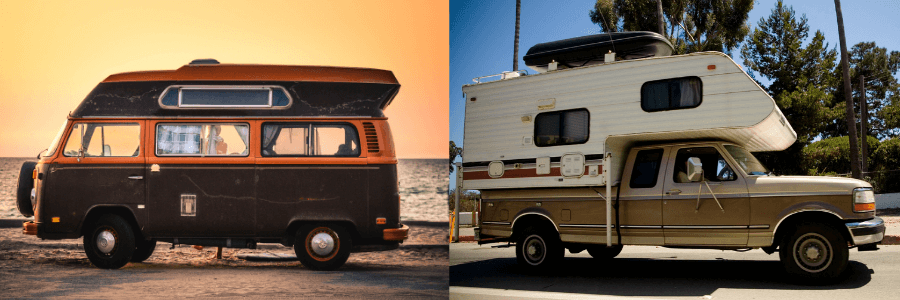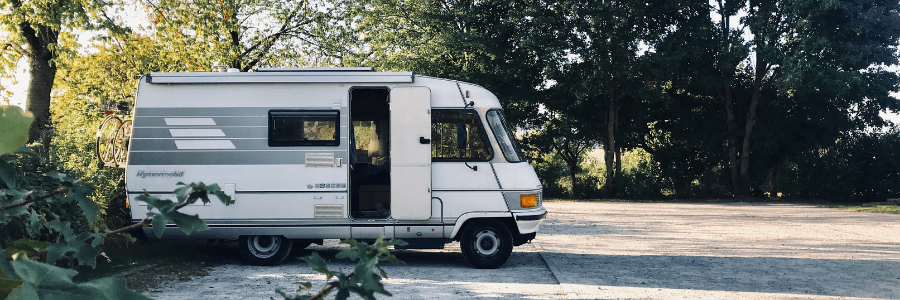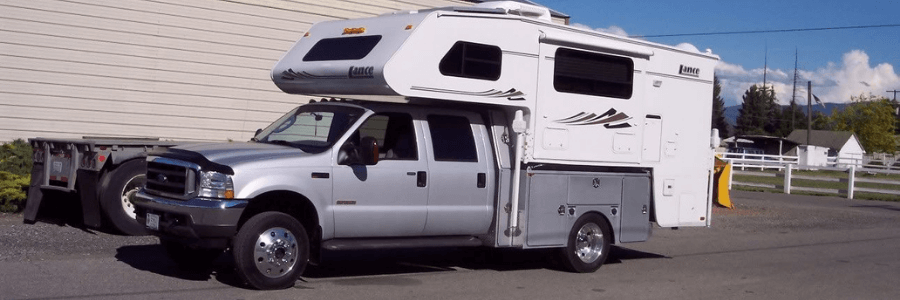Campers or Motorhomes?

Getting into the world of residential vehicles can be a little overwhelming at first. But you should be proud of yourself for finally taking the plunge! Owning an RV can be a freeing and empowering experience, not to mention a great way to explore the stunning sights our great nation has to offer! If you've considered all your options and narrowed it down to either a camper or a motorhome, you've come to the right place for your next steps. Here at O'Connor RV, we offer a wide variety of these RV types and always do our best to educate our customers so they can rest assured knowing they made the right purchase.
In this article, we'll discuss truck campers and motorhomes, the main attributes that set them apart, and the pros and cons of both! Read on to learn more about these equally impressive RVs!
Browse Campers Browse Motorhomes
Motorhome
A motorhome is a vehicle and living quarters all-in-one that range in size depending on its class. Class A units will be large, spacious, and bus-like. Class B units are much smaller converted vans suitable to hold 1-2 people. Class C motorhomes are more mid-sized vehicles that can comfortably sleep 2-4 people (you can get a more in-depth explanation of motorhome classes here). Motorhomes typically come complete with all the living essentials you need, including a toilet, shower, refrigerator, oven, and microwave. You can learn more about motorhomes in our top-ten motorhome FAQ blog post!

Pros
-
Space. Most motorhomes are quite spacious RVs, which allows for an easier transition, especially if you plan to travel for long periods with the whole family.
-
Variety. With Class A, B, and C options, motorhomes come in a wide range of styles (and prices). So, if you’re new to RVs, going with a motorhome makes it a lot easier to find an RV type that's right for you.
-
Single Unit Design. Unlike other RVs that require hitching onto a towing vehicle, motorhomes connect their driving and living areas. This is not only great for convenience, but again, if you're new to RV's, going with a motorhome can be a helpful transition.
-
Packing. Packing your belongings into a motorhome is much easier than trying to do so in a trailer or camper, especially when you’re trying to stay within the maximum towing capacity of your vehicle. Everyday items like toilet paper and cooking materials can often remain in the RV, which will also save you on time!
Cons
-
Maintenance expenses. Because a motorhome is a true vehicle that doesn’t require an additional towing vehicle, they do require a bit more maintenance which can add up in costs.
-
Driving. Unless you have experience driving buses or full-sized trucks, learning to maneuver a large motorhome can be somewhat daunting to some. While learning to drive a motorhome can be a bit tricky at first, in time, they are relatively easy to handle.
-
Storage. Storing a motorhome when not in use is something you'll want to consider as it can be inconvenient and costly for some. Unless you have a large enough property, you will need to find a storage space for your motorhome.
Browse Campers Browse Motorhomes
Campers
Truck campers are designed to sit on the top of a pickup truck bed, turning your truck into its own mobile home. Campers can typically sleep 1 to 3 people comfortably and are very easy to transport as virtually no hitching or towing is involved! With truck campers, the weight and measurement factors differ from other RV types. Instead of towing capacity, truck campers use the truck’s payload capacity. The length of the truck’s bed will affect the camper as well, which is why these RVs come in either short bed or extended bed versions.

Pros
-
Lightweight and convenient. Their lightweight and low-profile design make truck campers relatively easy to transport. You simply load it up when you need it and store it away easily when you don't!
-
Versatile. If you've got a heavy-duty truck on your hands capable of going off-road, you can now do so even with a home attached. Unlike other RVs, you're also not restricted to certain areas when setting up camp.
-
Low Maintenance. Unlike other RVs like motorhomes, campers don't require a whole lot of ongoing maintenance since they are independent of a vehicle. Other than regular wear and tear prevention like winterization, there won't be much to repair or replace.
-
Inexpensive. Assuming you already have a truck, purchasing a modest camper will be somewhat cheaper than other RVs.
-
Low insurance. Some insurers may allow you to add your truck camper as a part of your regular car insurance to protect your camper from damage or theft. If that's not possible, it's relatively easy to get specific truck camper insurance at a minimal cost.
Cons
-
Heavy. Since these RVs require a mighty truck to haul them safely, you might already get the idea of how heavy they must be. Be sure to get an RV that fits within your truck’s maximum payload and the truck's bed length.
-
Requires a truck. This should be a given at this point, however, it can be a deterrent to some folks if they don't already own one.
-
Height. These campers have a generous amount of headroom as they sit on the bed of your truck. This can be a concern when driving in high winds or in areas with low clearance.
At O'Connor RV, We're Here to Help
Ready to check out our inventory of campers and motorhomes? At O'Connor RV, we don't just sell RVs, we sell an empowering experience. Have complete control over your surroundings, wherever your journey might take you! With full transparency to our customers of Chilliwack and beyond, we aim to do our best to get all the answers to your burning questions! Drop by, send us a message, or give us a call at 1-877-912-3009 today!
Browse Campers Browse Motorhomes